SUMMARY
This is AI generated summarization, which may have errors. For context, always refer to the full article.
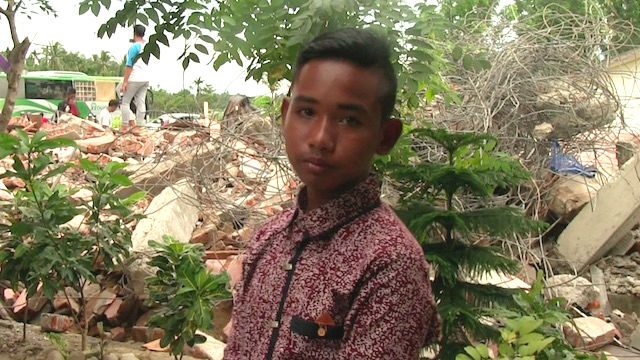
PIDIE JAYA, Indonesia – It was 5:05 am when the ground shook violently in the sleepy regency of Pidie Jaya.
Agam, 13, was asleep on the second floor of his family’s home, when he was jolted awake. A window fell on top of him rendering him motionless. He was trapped.
“I cried out for help. My neighbor heard me,” he said.
He was told not to move. He was told they would return with a backhoe. They kept their promise. He was dug out from the rubble two hours later and brought to the hospital.
“I thought I wouldn’t survive, because I thought there wouldn’t be anyone around at 5 o’clock. But it turned out there were,” he said quietly.
But surviving wasn’t the biggest surprise for Agam.
“I thought my mom and dad had already gotten out,” he said, his voice cracking. “But it turned out they were stuck underground.”
The young teenager was the only one from his family of 5 to survive. The rest, who were sleeping on the ground floor, had their house fall on top of them, crushing them as they lay on their beds.
They never made it out alive. Not his little sisters, Nur Azizah, 5 and Intan Sofia, 12. Not his 45-year-old father, M Nur Bin Yasum. And not his mother, Siti Sahrum, who was 5 months pregnant.
‘Help! Help!’
Agam’s father, M Nur, did not die instantly.
He called out for help through the rubble, even shining a flashlight through the cracks to signal his location. His wife’s voice, pleading for help, was heard briefly too.
Nurzana, their neighbor who heard the family’s cries, said she had just woken up for morning prayers when her house started to shake.
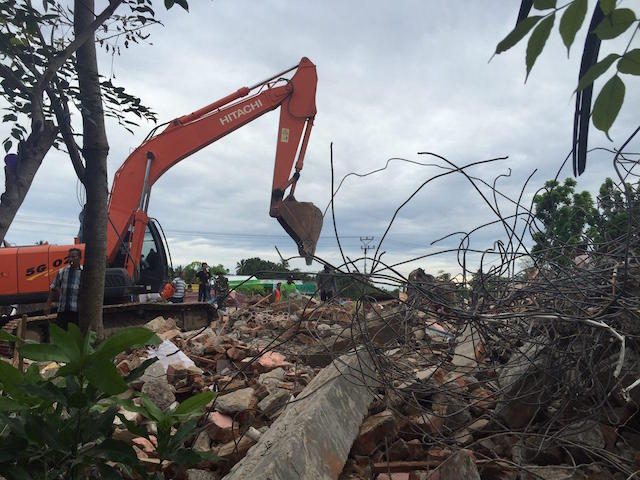
The power went out. She, her husband and her children tried to escape but were stuck inside their one-storey house. The main door was jammed, trapping them throughout the course of the earthquake.
But Nurzana had a different fate. While she couldn’t escape, her house somehow withstood the Earth’s angry rumbling.
“Only after the quake was over could we come out,” she said. “When we came out, [M Nur] was already buried underneath the ground.”
Nurzana, who lives next door, said that by the time the quake ended and she managed to step outside her neighbor’s whole house had collapsed and been reduced to rubble.
And then she heard voices. And saw a single light.
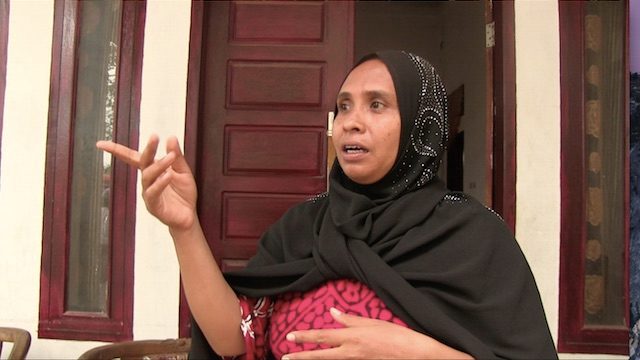
“We saw the light of a flashlight. Maybe [he] was still alive, and had just fallen,” she said. “I heard someone calling for help. His wife once, and [M Nur] once. ‘Help… help.’”
The voices were soft to begin with, but it soon faded into silence.
“After that, they didn’t speak again,” she said.
Lone survivor
Nurzana said she also heard Agam crying out from a different spot: “I am in here,” she recalls him saying.
She then searched around for something – or someone – that could help. There was a backhoe, but the operator was nowhere to be found. Residents ran past her, as they rushed towards the mountain, fearing for their lives.
Traumatized by 2004 – when a tsunami barreled in after an earthquake and wiped out about 170,000 Acehnese – residents fled and paid her little mind, leaving Nurzana alone to frantically find ways to free her neighbors.
The tsunami never came this time around. And neither did help come fast enough for the family of 5.
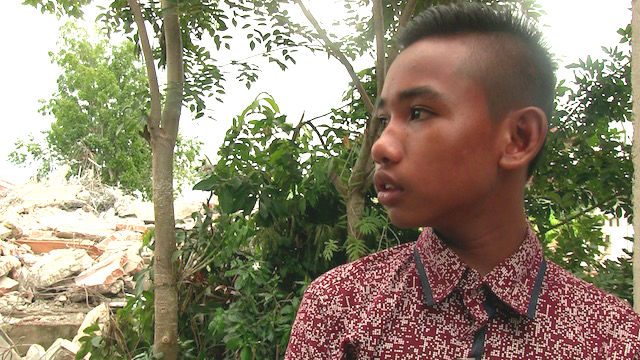
The earthquake came at early dawn, but it wasn’t until 10 am when the bodies were finally extracted.
“It took an hour to free [Agam] alone,” she said motioning to the shell-shocked survivor. “He was only scratched on his arms and legs.”
His parents and little sisters were a different story.
“The 6th grader [Intan Sofia] got her face trapped. It was flattened,” Nurzana said, squeezing her face to demonstrate the state they found her.
“As for M Nur, he was bloody. Even as his body was being bathed, it was still bleeding.”
Died, buried together
M Nur, his wife, and his young girls, were among the 101 victims killed in Pidie Jaya, after a 6.5-magnitude earthquake struck on Wednesday, December 7. His house was one of many destroyed, rendering over 45,000 homeless.
Mosques, markets, shops and roads were among those destroyed by the earthquake, which also injured over 800 others in the predominantly Islam province.
M Nur and his family were pulled out at before noon, but they weren’t buried until late in the evening, around 9pm.
M Nur’s sister, Siti Hajar, who lives outside Pidie Jaya, came quickly upon hearing the news. She said she got a call from their younger sister who lives nearby, to tell her that “the house was already level with the ground.”
“I thought, if it’s already level with the ground, even if they survive, they would surely be badly hurt. Then I called back 30 minutes later, and they said the backhoe had not yet come,” she said. “If after 30 minutes, help has not yet come, we leave it to the Almighty.”

Siti Hajar’s gut was right. By the time she had arrived, her brother and his family, except Agam, were all gone.
“When I got here, my brother’s body was being prayed over, while the bodies of his children and his wife hadn’t been bathed yet. After my brother was bathed, the youngest was bathed, then the second child, and lastly the wife,” she said.
“There is only one grave, but inside there are several gaps. We waited for the wife’s family [from Medan] for two hours. The whole family was buried together.”
Siti Hajar said the last time she saw her brother was in this very house during the July holidays.
“We had fun and laughed together here,” she said, gazing into the rubble.
‘Allah’s will’
Friends and family remember M Nur, who was in the construction business, as a hard worker who was generous with his earnings.
“He was very kind,” said his sister. “He used to buy land and give it to the needy…. he was a very generous person.”
Nurzana agreed, adding her neighbor was at the peak of his career.
“He was doing very well. He was in his prime. He was a contractor and he was on his way up. He had 3 backhoes.”
But never did M Nur think that these backhoes that helped build his business, would be the same ones used to extract his family’s body from the rubble of their own home.
Siti Hajar said her brother was even able to pick up a phone call from a friend, but was unable to respond.
“He could pick up, but he couldn’t talk. He just cried into the phone. Maybe it was already too stuffy and he couldn’t breathe,” she said.
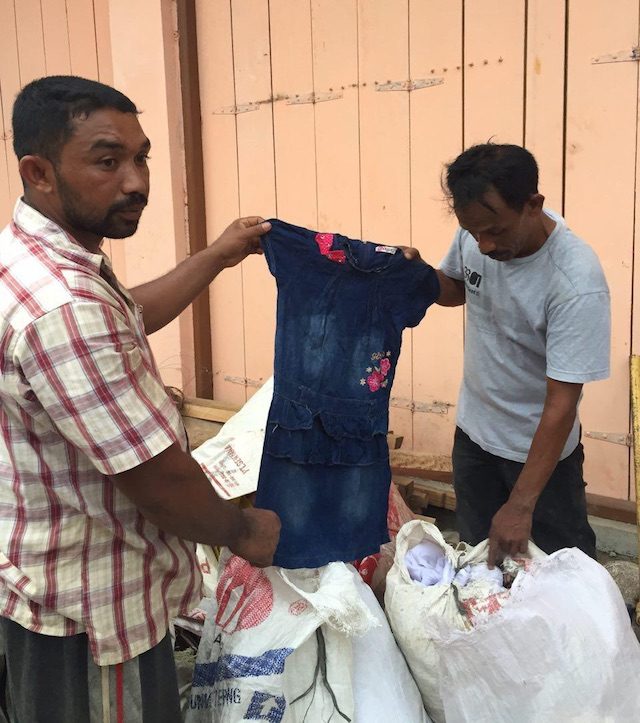
But as with most who live in the region of Aceh, the most religiously conservative area in Indonesia where many follow Sharia law, Siti Hajar accepted the death of her brother, sister-in-law and nieces as Allah’s will – a common sentiment among those here who lost homes and loved ones.
“We leave it up to the Almighty, this is fate, so we let it go. Even though we cry, that is the will of Allah,” she said. “Who would not be sad? 4 people being called [by God] at once like that, buried together like that. It’s very sad.”
But young Agam – who just two nights earlier slept comfortably in his room, and who suddenly lost his parents, siblings and home in a blink of an eye – could talk about nothing but the pain.
“When I saw the bodies of my mom and dad, I felt very sad. I thought they were still alive, but they had already passed away.” – Rappler.com
READ MORE:
Add a comment
How does this make you feel?
There are no comments yet. Add your comment to start the conversation.